AUTHOR OF THE REPORT: ASSOCIATION OF INDEPENDENT PRESS OF MOLDOVA
PHOTO: Attack on journalist Nadejda Roșcovanu on May 9, 2024. Photo credit: Viorica Tătaru
1/ KEY FINDINGS
In the Republic of Moldova, 66 cases of attacks/threats against professional and citizen media workers and editorial offices of both traditional and online publications were identified and analysed in the course of the research for 2024. Data for the study was collected using open source content analysis in Romanian, Russian and English. A list of the main sources is presented in Annex 1.
- The majority of incidents (56 or 85% of the total) were non-physical and/or cyber-attacks and threats. Such attacks have been the main way of putting pressure on media workers in Moldova since 2017.
- One-third of the attacks on media workers took place before and during the campaigns for the presidential elections and the constitutional referendum on Moldova’s accession to the European Union. In 2024, 29 attacks (44% of the total) came from persons not connected to the authorities, and 20% were carried out by persons unknown. Some used fake accounts.
- At least 18 attempts to intimidate journalists (about 29% of the total) were initiated by representatives of local and regional authorities.
- Attacks on Moldovan journalists by the separatist authorities in the de facto Russian-controlled Transnistrian region continued in 2024, with cases of illegal detentions and interrogations.
Not all attacks and threats are publicly reported because many journalists consider non-physical threats and cyber-attacks to be an unavoidable part of their daily professional work and, therefore do not report them.
2/ THE POLITICAL SITUATION AND THE MEDIA IN MOLDOVA
In its annual press freedom rating, the international organisation Reporters Without Borders (RSF) ranked Moldova 31st out of 180 countries in the world. This was a drop of three places from 28th in 2023. The report stated that “Moldova’s media are divided into pro-Russian and pro-Western camps. Oligarchs and political leaders strongly influence their editorial stances”. The media landscape is polarised and influenced by Ilan Shor, a pro-Kremlin oligarch who fled to Russia to avoid prosecution on corruption charges in Moldova.
According to the data of the Audiovisual Council (the national regulatory authority), as of 31 December 2024, there were 50 licensees for 55 television services and 55 licensees for 59 sound broadcast services in Moldova. The total number of TV and radio stations slightly decreased.
According to the Barometer of Public Opinion of September 2024, a survey conducted by the Centre for Social Studies and Marketing “CBS-Research” and the Institute for Public Policy, 84% of Moldovan citizens use the Internet every day; 56% watch TV daily; 32% listen to the radio; and 16% read newspapers daily, including online. For 26%, the most credible source of information is television; for 12%, news sites; and for 10%, social media. Compared to previous years, there has been an increase in the number of citizens who get information from the Internet (including websites and social media).
The most important event of 2024 was the presidential elections on 20 October (the second round took place on 3 November). At the same time as the first round, a constitutional referendum was held on whether the goal of joining the European Union should be included in the Moldovan Constitution. Ahead of the elections, RSF drew attention to foreign interference in Moldova’s information space, noting that disinformation, especially from Russian sources, was a major challenge for Moldova, contributing to the division of public opinion and creating a tense political climate. The report of the National Democratic Institute’s (NDI) pre-election assessment mission revealed that Russia had intensified its disinformation campaigns in Moldova since it began its full-scale invasion of Ukraine. “Foreign information manipulation and interference (FIMI) is one of the biggest challenges for Moldovan democracy and the integrity of the upcoming elections,” the report said.
By order of the Intelligence and Security Service (SIS), Moldovan users were blocked from accessing seven Russian propaganda websites and a Moldovan anti-EU propaganda portal. In 2022 and 2023, the broadcast licenses of several TV stations were suspended, and about 70 websites were blocked, with the declared aim of protecting Moldova’s information space from malicious propaganda influences.
In 2024, a new law on access to public interest information came into force in Moldova, including granting better access to information for journalists.
In order to support quality print media and maintain affordable newspaper subscription prices after the unprecedented increase in the cost of distribution of periodicals (3.4 times compared to 2023), the Moldovan Government has established a Periodicals Distribution Funding Facility. Through this mechanism, the distribution costs of periodicals are covered by the public budget through the state enterprise “Poșta Moldovei”, the list of beneficiaries being established and updated by a council of media experts based on the results of the monitoring carried out by the Association of Independent Press (API).
3/ GENERAL ANALYSIS OF ATTACKS
After a decrease in the number of reported attacks on journalists in 2022 and 2023, the situation worsened in 2024. There were 66 attacks on media workers reported, a third more than in the previous year. Fifty-six of these attacks (85%) were non-physical and/or cyberspace attacks and threats; in eight cases (12% of the total) journalists and media outlets were attacked using legal and/or economic mechanisms; and two cases of physical attacks and threats to the life, liberty and health of media workers were reported (3% of the total).
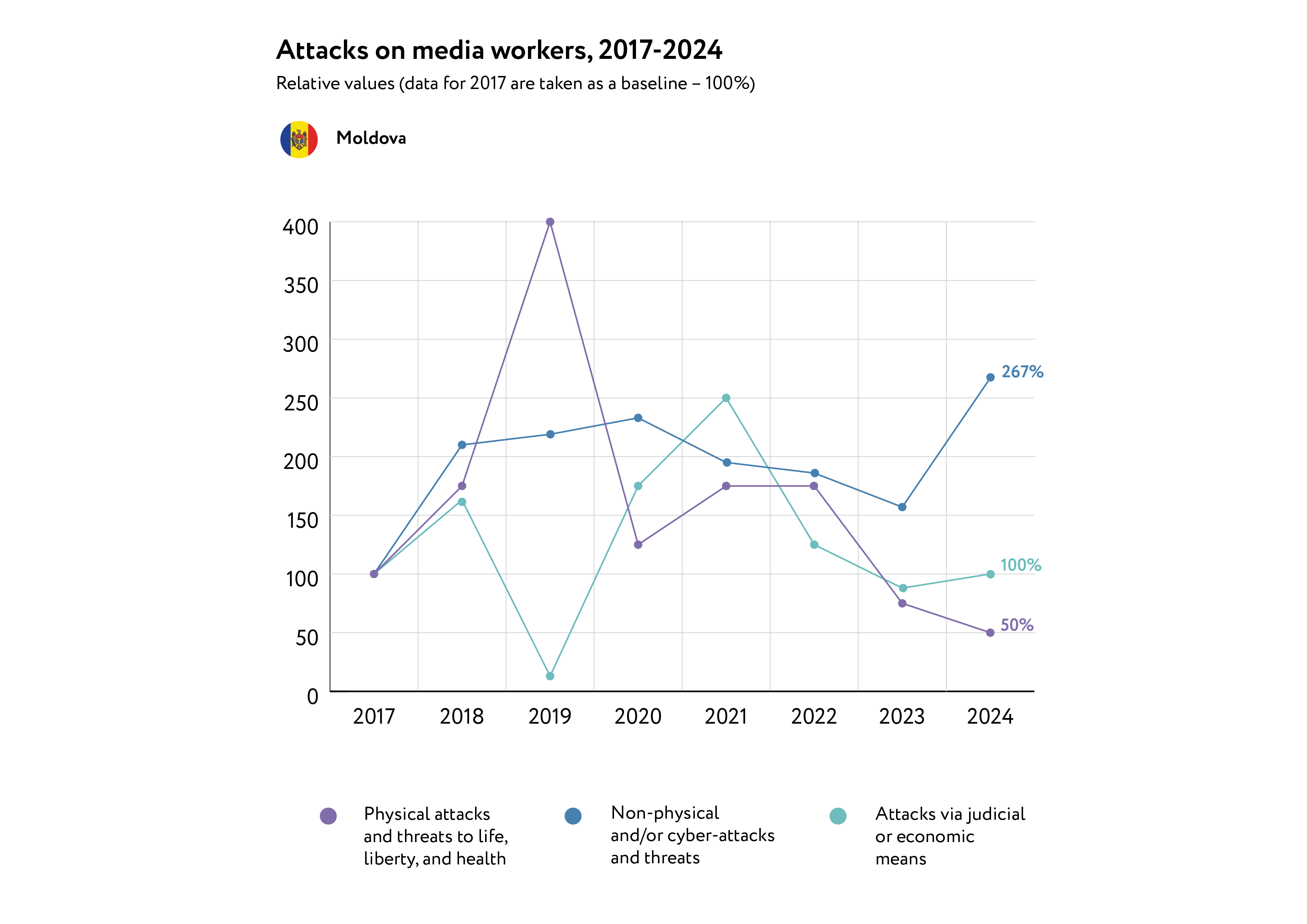
The main sources of attacks on media workers in 2024 were: persons not connected to the central or local authorities, including politicians and candidates in elections (29 cases or about 44% of the total); representatives of regional authorities (19 cases, 29% of the total, mainly from the Gagauzian Autonomous Region, but also the General Mayor of the capital, Chișinău); in 14 cases (21%), media workers were attacked by persons unknown, including during protests organised by pro-Russian opposition political forces and online from fake accounts. There were also two attacks on Moldovan journalists by the unrecognised administration in the Transnistrian region, involving illegal detentions and interrogations.
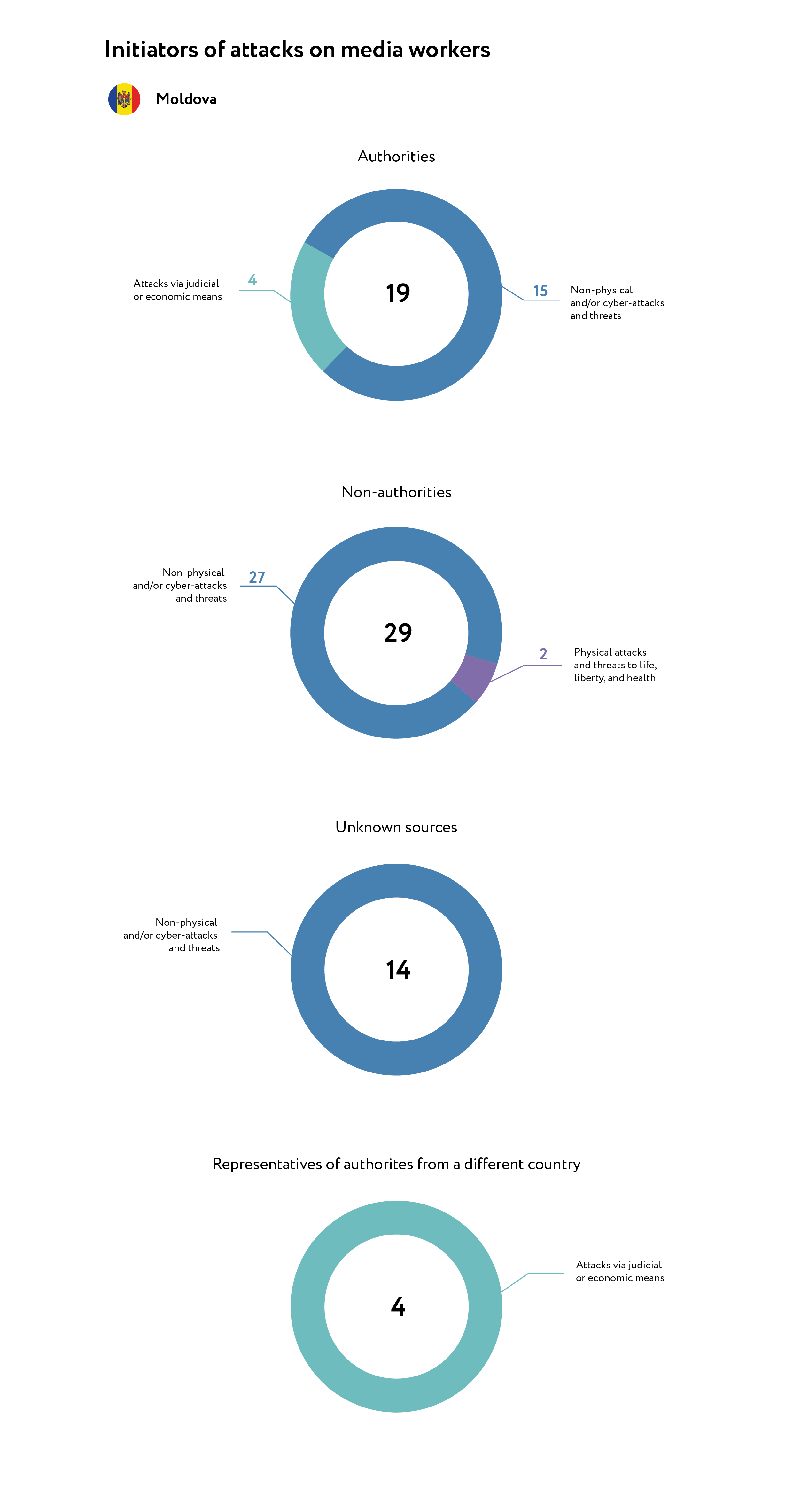
Employees of 18 media outlets and organisations in Moldova were attacked or threatened in 2024. The most frequent targets of attacks were staff from TV8/TV8.md, who were involved in 18 reported incidents; the investigative publication, Ziarul de Gardă/ZdG.md, suffered ten attacks; Jurnal TV/Jurnal.md, eight attacks; the Investigative Journalism Centre/Anticoruptie.md and Nokta.md portal of the Gagauzia Autonomous Region, were subjected to five attacks each. The portals Nordnews.md (Bălți), Newsmaker.md, Agora.md, Diez.md and other media and organisations also reported attacks.
4/ PHYSICAL ATTACKS AND THREATS TO LIFE, LIBERTY AND HEALTH
In 2024, there were just two registered cases of physical attacks and threats to the life, freedom and health of Moldovan media workers, the lowest number since 2017.
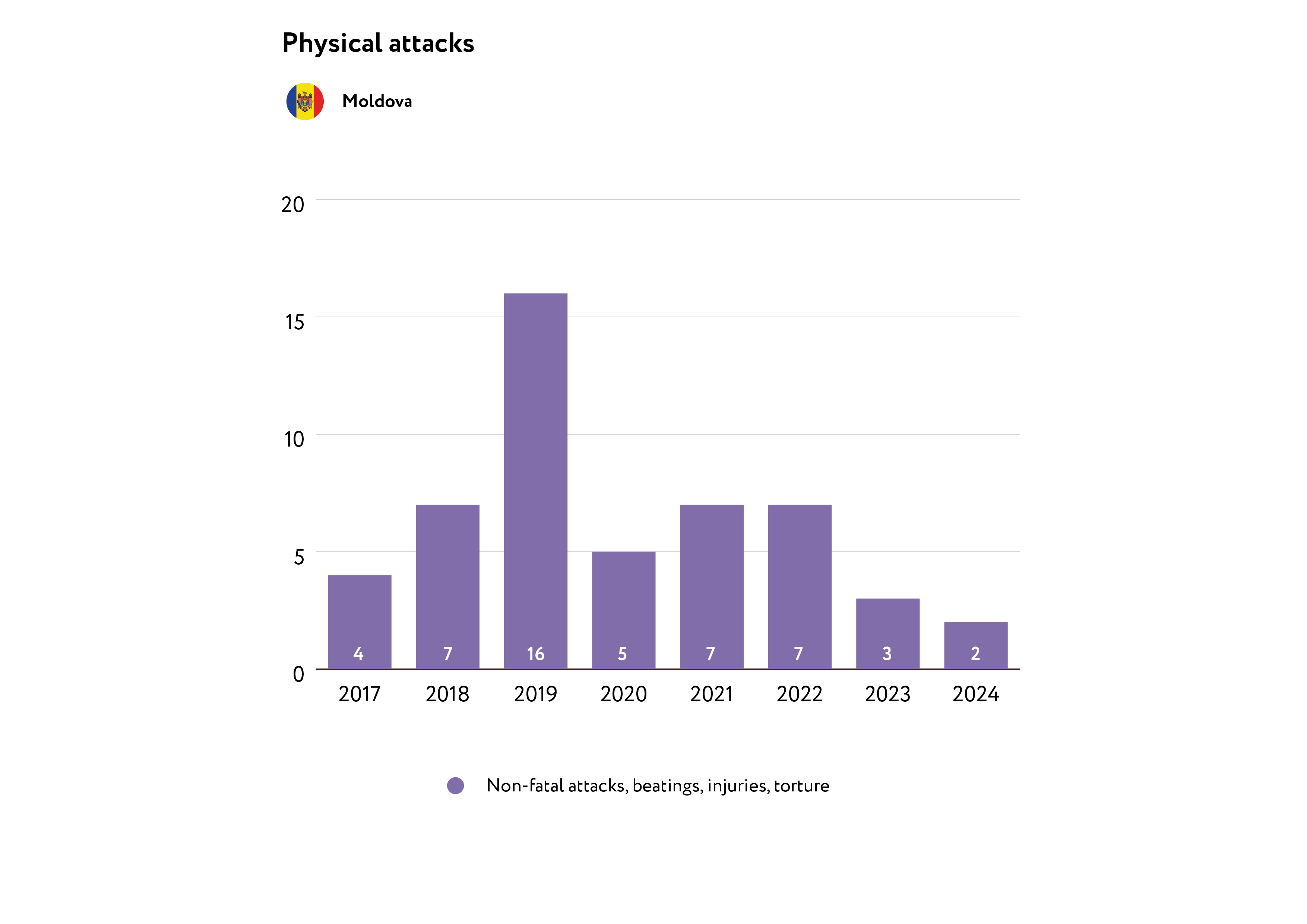
- On 9 May the journalist Nadejda Roscovanu, was filming the so-called “Victory March”, marking the anniversary of the end of World War II. She was physically assaulted by several participants who demanded that she stop filming and asking them questions. Roscovanu was pushed, kicked, called obscene names and subjected to death threats.
- In June 2024, Natalia Zaharescu, a journalist for the weekly newspaper Ziarul de Gardă, was covering the construction of the Gagauzland amusement park in the Gagauz Autonomous Region. She was intimidated by a person who prevented her from filming and demanded that she leave the area. At one point, the unknown man grabbed the journalist’s microphone and tried to snatch it from her.
5/ NON-PHYSICAL AND/OR CYBER-ATTACKS AND THREATS
Non-physical and/or cyber-attacks and threats remain the most widespread method of applying pressure on Moldovan journalists and media outlets. In 2024, 56 non-physical attacks and threats were reported, which represents 85% of the total number of attacks, a significant increase compared to previous years (in 2023, 77% of attacks were like this, in 2022 it was 67%, and in 2021, 60% of the total number of reported incidents). Among the main methods of pressure were bullying, intimidation and defamation. Some examples are presented below:
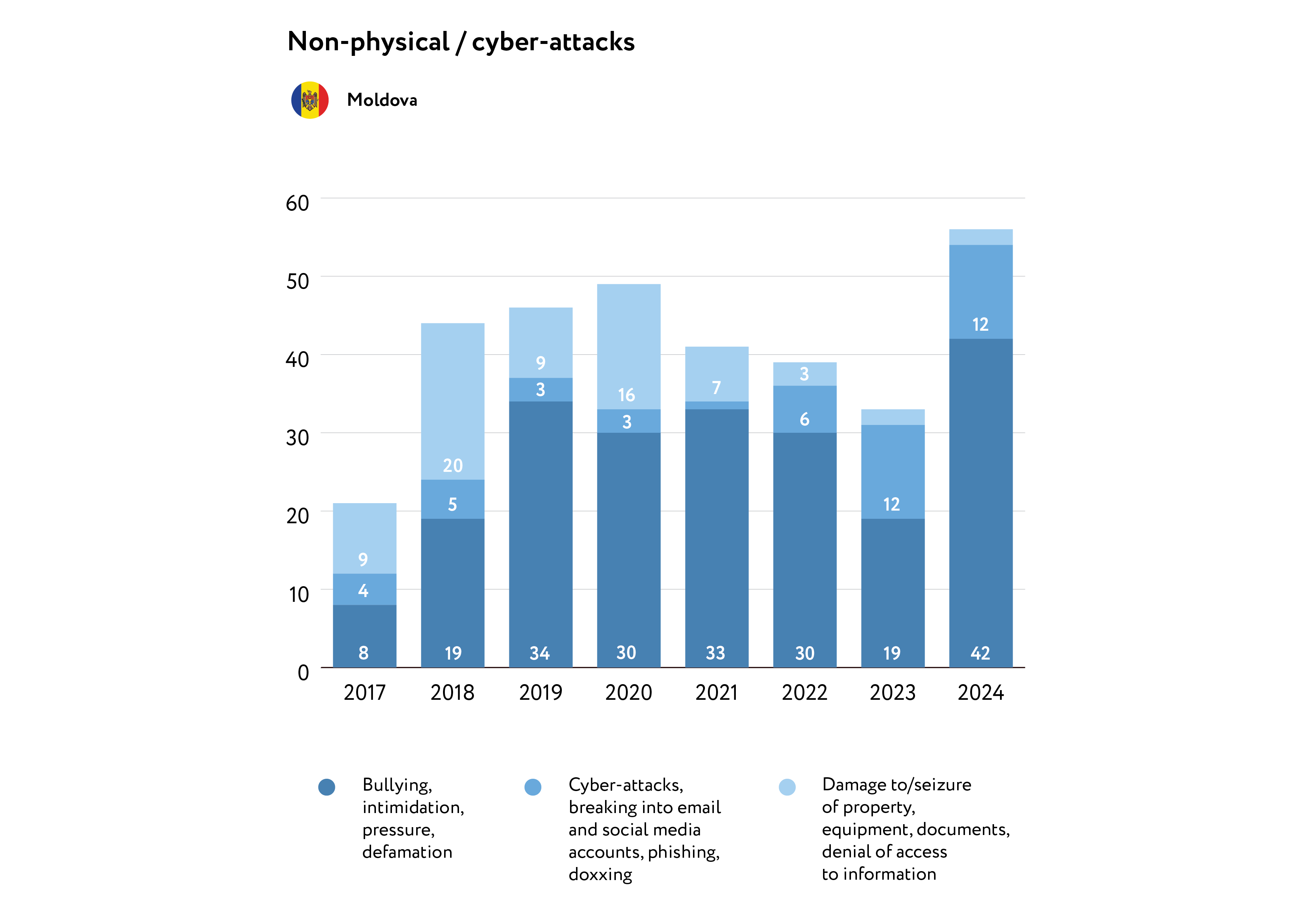
- On 12 January, during a Facebook live stream, Mihail Vlah, advisor to the governor of the Gagauzia Autonomous Region, insulted journalists from the Nokta.md portal, the director of the portal, Mihai Sirkeli, and the executive director of the Association of the Independent Press, Petru Macovei.
- On 31 January, Marianna Prysiazhniuk, correspondent of the Ukrainian portal Glavcom.ua, was verbally attacked in a restaurant in Chișinău. The journalist was in a Zoom session when a couple overheard her conversation, approached her and insulted her, telling her to “go back to Ukraine”.
- On 10 April, journalists from the Comrat-based portal Nokta.md, Mihail Sirkeli and Vlada Verșinina, were publicly insulted during a protest organized by the leadership of the Gagauz Autonomous Region.
- The journalist Elena Celac, a contributor to the Anticorupție.md portal, was insulted on 20 May by Ilya Uzun, the deputy governor of the Gagauzia Autonomous Region. When asked about the income of the companies registered in his wife’s name, Uzun called the journalist a “sick woman”.
- On 13 September, the journalist Vasile Botnaru (Vocea Basarabiei TV) received a death threat from a Facebook user: “Soon they will find you hanging! You don’t have much time left, either against the wall or with your throat cut!”
- During a march on 22 September, organised by activists of the youth organization of the political bloc Pobeda/Victoria against the European integration of Moldova, journalist Viorica Tataru (TV8) was verbally assaulted by a protester.
- On 7 October, journalists from the Bălți-based portal, Nordnews.md, were intimidated by the Moldovan presidential candidate, Victoria Furtună, who accused them of being supporters of the ruling party.
- On 1 November, journalists Daria Slobodchikova and Denis Borshevich of the portal NewsMaker.md received audio messages containing threats, apparently staged in an election context to discredit Moldovan President Maia Sandu, who was running for a second term.
- Two days later, on 3 November, businessman Veaceslav Platon (who is under investigation in several criminal cases and is wanted internationally) published a defamatory post about the journalists Alina Radu (Ziarul de Gardă) and Mariana Rață (TV8), accusing them of receiving monthly payments from a political party. This triggered a wave of defamatory comments against both journalists and their family members.
- On 4 November, Vlad Țurcanu, general director of the public radio and television company Teleradio Moldova, received death threats from unknown sources.
- On 9 December, the General Mayor of Chișinău, Ion Ceban, who is also the leader of the National Alternative Movement political party, insulted several journalists and vloggers at a meeting at City Hall. He called the activists and vloggers, as well as journalists Alexandru Cozer (Jurnal TV), Mariana Rață (TV8), and Vitalie Călugărereanu (Jurnal TV), “clowns and psychopaths”.
The number of cyber- and DDoS-attacks and other hacking incidents, including phishing and doxxing, were the same as in the previous year. Following these attacks, readers were unable to access some news portals for several hours. These are examples of some of these attacks:
- On 9 January, the digital resources of TV8 were subjected to a powerful cyber-attack, and fake messages were sent from the newsroom’s official e-mail address.
- The portal Laf.md (Comrat) was cyber-attacked on 22 January after publishing an article about how Gagauzian politicians are linked to the convicted oligarch Ilan Shor, who is hiding in Russia from the authorities of the Republic of Moldova.
- On 31 January, the ZdG.md portal was targeted by Russian hackers in a DDoS attack.
- On 13 May, the Anticoruptie.md and Investigatii.md portals were blocked following a DDoS attack.
- The servers of the Ziuadeazi.md portal in Cahul were attacked on 25 June.
- On both 3 July and 19 July, the Investigative Journalism Centre reported that several posts on the Facebook page of Anticorupție.md had been deleted as a result of multiple referrals to Meta sent in a concerted trolling effort by pro-Russian groups.
- In October, the news portal Diez.md reported cyber-attacks on the day of the parliamentary elections and constitutional referendum in Moldova (20 October 2024) and also two days later.
- On 29 November, unknown persons forged a card issued by a banking institution in Moldova in the name of the investigative journalist, Pavel Păduraru. The same day, the journalist filed a complaint with the Prosecutor General’s Office. Păduraru believes that he was targeted to defame him and present him as part of an organised criminal group.
5/ ATTACKS VIA JUDICIAL AND/OR ECONOMIC MEANS
Eight cases of judicial and/or economic attacks were recorded in 2024 (12% of the total number), the same as in the previous year. In a few cases, newsrooms were involved in civil lawsuits or were served with pre-trial statements before going to court for alleged defamation, following the publication of journalistic material. Attacks on Moldovan journalists by unrecognized authorities in the breakaway separatist Transnistrian region also continued.
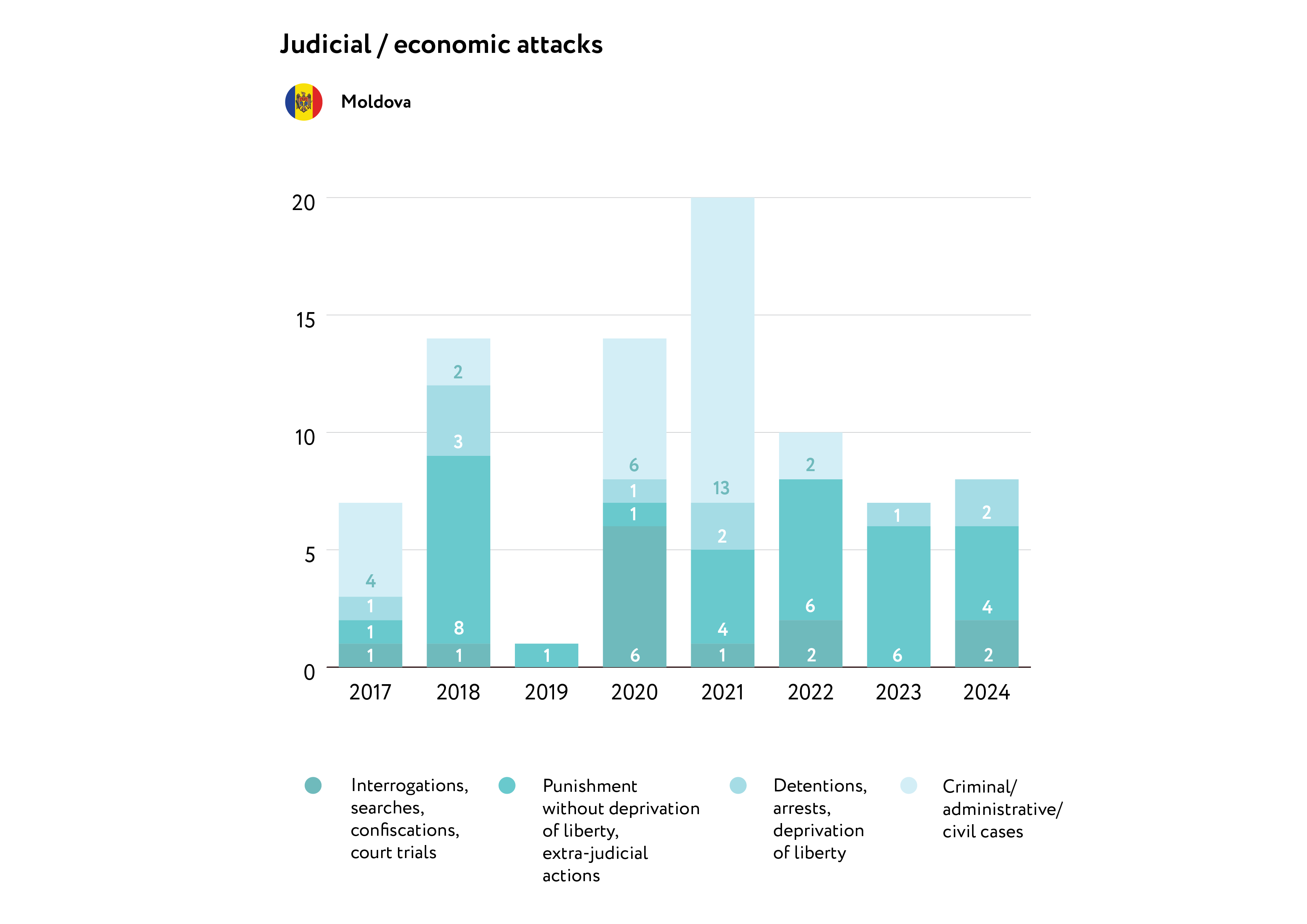
- On 19 January, two municipal companies in Chișinău (Exdrupo and the Association for the Management of Green Spaces) threatened TV8 with a lawsuit if the TV station did not publicly apologise for a report on the poor quality of snow removal in the capital.
- Journalist Viorica Tătaru and cameraman Andrei Captarenco (from TV8) were detained on 24 January in the city of Tiraspol, while filming a protest organised by separatist authorities in the Transnistrian region against changes in Moldova’s Customs Code that would tax exports from the region at the same rate as exports from other regions of the country. The journalists were detained by a group of unidentified persons wearing the uniforms of the region’s unconstitutional structures, and forcibly transported to the so-called “Ministry of Security” of the region. They were interrogated separately there for almost three hours and forced to delete the video footage of the protest. Both journalists were released the same day.
- On 7 May, after the portal Ziarul de Gardă (Zdg.md) had written that an employee of the Moldovan Embassy in the Russian Federation had spread untrue and humiliating information on social media, which provoked interethnic dissent, the employee demanded that the allegations be withdrawn, threatening the newsroom with a lawsuit and demanding damages for defamation.
- The Moldovan presidential candidate, Andrei Năstase, warned Jurnal TV on 22 October that he would sue the station for allegedly spreading false statements about him for defamatory purposes. The politician demanded that the information be retracted and that one million lei (about 52,000 euros) be paid in compensation.
ANNEX 1: OPEN SOURCES USED FOR GATHERING DATA (MOLDOVA)
- Association of Independent Press (API) – a non-commercial organisation that promotes and assists the sustainable development of media organisations and independent journalists at a national and regional level by strengthening professional capacities, increasing resilience and improving public policies in the media field;
- Agora.md – an online Romanian-language news portal;
- Broadcasting Coordinating Council of the Republic of Moldova – a regulatory authority on public and private audiovisual media in Moldova. The CCA (Consiliul Coordonator al Audiovizualului) supervises the enactment of the Broadcasting Code, and issues broadcasting licences and retransmission authorisations;
- Freedom House – an international human rights NGO that evaluates and publishes reports on the level of freedom in 210 countries and territories worldwide, including on freedom of speech and media activity;
- Jurnal.md– an online Romanian-language news portal;
- Institute for Public Policy of Moldova – an independent, nonpartisan and nonprofit organisation, committed to the values of individual liberty, democratic society, rule of law, and free market economy;
- Independent Journalism Centre (CJI) – a non-governmental organisation active in protecting democracy and those who believe in its values;
- National Bureau of Statistics of the Republic of Moldova – a central administrative authority which, as the central statistical body, manages and coordinates activity in the field of statistics in the country;
- Nordnews.md – a regional Romanian-language online news portal (based in the city of Bălți);
- NewsMaker.md – an online Russian and Romanian-language news portal;
- PRO TV Chișinău – a branch of the Romanian television channel in Moldova;
- Reporters Without Borders — an international non-profit and non-governmental organisation with the stated aim of safeguarding the right to freedom of information;
- Rise.md – the internet portal of a group of investigative journalists.
